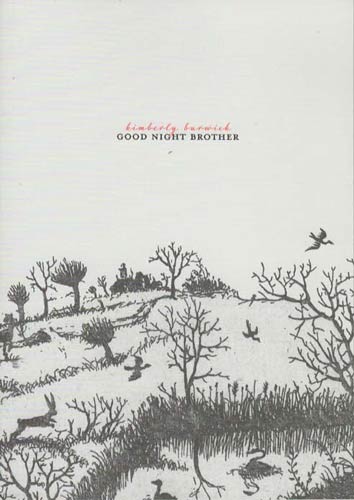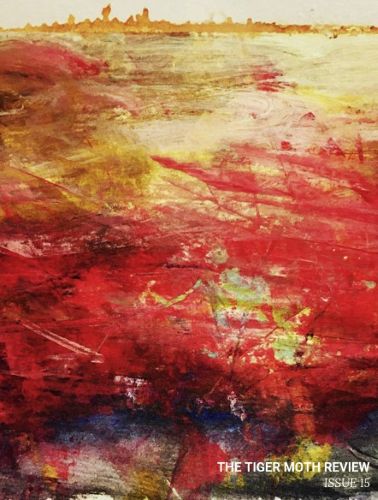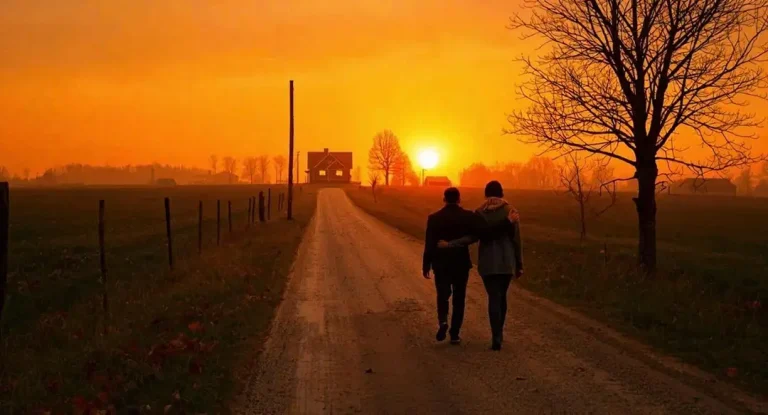Every line, phrase, and syllable of Kimberly Burwick’s Good Night Brother is thick with a language that perhaps only angels know. As I read these dense, imagistic lines, I recall the charismatic churches of my youth when, at Sunday morning worship, any number of individuals might erupt into an otherworldly song in “tongues,” coming from the spirit within. Perhaps Burwick has such a spirit—a poetic spirit that transforms “milkweed,” “geese,” “pheasants,” “berries,” “roads,” and “flies” into abstractions, the reader reveling in the feel of this strange language passing over the pores of the page. Every line, phrase, and syllable of Kimberly Burwick’s Good Night Brother is thick with a language that perhaps only angels know. As I read these dense, imagistic lines, I recall the charismatic churches of my youth when, at Sunday morning worship, any number of individuals might erupt into an otherworldly song in “tongues,” coming from the spirit within. Perhaps Burwick has such a spirit—a poetic spirit that transforms “milkweed,” “geese,” “pheasants,” “berries,” “roads,” and “flies” into abstractions, the reader reveling in the feel of this strange language passing over the pores of the page.
I no sooner opened this small portrait-size collection (the book is only 5×7”), then I felt that I was embarking on a journey deeply personal. “To my son, Levi” the dedication reads, “—the sowing time, the harvest, the always.” This sowing and harvesting is thematically woven throughout the landscapes and relationships within the poetry forcing the reader to ponder: What is being planted and taken? Who is reaping and who is being reaped—or ravaged? What does this darkly whimsical, lush, and savage landscape represent? Are the body and the spirit really disconnected? Or are they the same? In “The Therapists Say to Admit the Nature of You,” I read, “Every sentence is really a question of harvests.” Each poem tumbles with these questions echoing against a rambling landscape of semi-primitive haunts, desires, and scavengers, a natural world more recognizable for its inseparability from the soul and spirit than its connection to physicality alone.
Sometimes the language becomes so imagistic and attractive that I find myself romancing the music far more than reaping these lines for their deeper meanings. In other words, this collection is enjoyable enough as romp through a thicket of beautiful writing. “And the underbelly of convection clouds,” reads “The Sister,” “become blossoms in their benumbed geometry / and the ground-blooms are rough-housed in the wind.” Despite the darker undertones of possible sexual assault, panic attacks, and therapy sessions, these lines first transfix me with their ability to make me into a landscape, not just see one.
One can see, however, how this landscape is fit to its purpose since women have often, in literature, identified their contradictory nature—body and spirit—with both the domestic and wild groanings of the Earth. The female speakers in this collection are clearly fearful, ravaged, and seeking solace. As landscapes they have been taken advantage of but have also gloried in their terrestrial abundance and strength. Their pain permeates from this contradiction: that desire can lead to both pleasure and destruction. The speaker laments in “Light of the Perishable”:
Though I haven’t mastered
the fragments—your coral
fingertips and suicide eyes,
the foolish virgins who take you
in and mouth-feed you
landscapes with oregano and
the right god.
While the women in these poems must contend with the guilt and shame for sins done against, they mostly wrestle with their nature as landscapes so wanted, so hunted, so easily destroyed by “a brother,” someone too close to forgive yet too close to ignore.
If the themes expressed in Kimberly Burwick’s Good Night, Brother do not appeal to some readers, I guarantee the musicality of her language will. This book is a thicket of rhythm and sound well-parsed, carefully mapped on the page, full of concrete images that lend themselves perfectly to abstract ideas. I wholeheartedly invite readers to amble through this “angel kissed” language (“Massachusetts, 1987”) to ponder how much “God would be closer” to our questions, grief, and wrestling “if he could” (“Pastured”).





